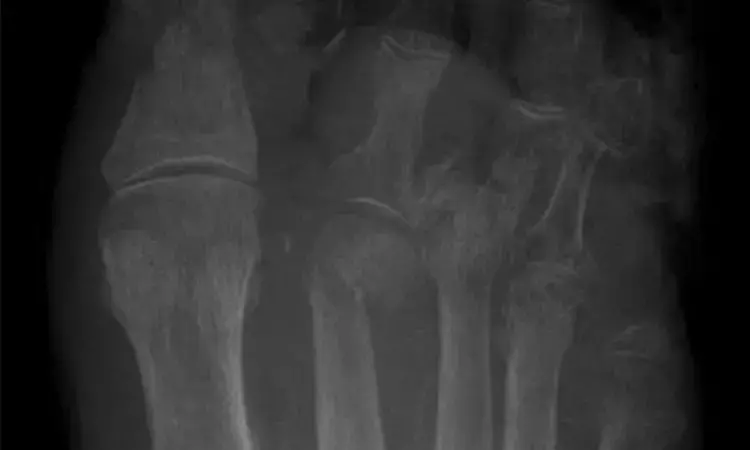- Home
- Medical news & Guidelines
- Anesthesiology
- Cardiology and CTVS
- Critical Care
- Dentistry
- Dermatology
- Diabetes and Endocrinology
- ENT
- Gastroenterology
- Medicine
- Nephrology
- Neurology
- Obstretics-Gynaecology
- Oncology
- Ophthalmology
- Orthopaedics
- Pediatrics-Neonatology
- Psychiatry
- Pulmonology
- Radiology
- Surgery
- Urology
- Laboratory Medicine
- Diet
- Nursing
- Paramedical
- Physiotherapy
- Health news
- Fact Check
- Bone Health Fact Check
- Brain Health Fact Check
- Cancer Related Fact Check
- Child Care Fact Check
- Dental and oral health fact check
- Diabetes and metabolic health fact check
- Diet and Nutrition Fact Check
- Eye and ENT Care Fact Check
- Fitness fact check
- Gut health fact check
- Heart health fact check
- Kidney health fact check
- Medical education fact check
- Men's health fact check
- Respiratory fact check
- Skin and hair care fact check
- Vaccine and Immunization fact check
- Women's health fact check
- AYUSH
- State News
- Andaman and Nicobar Islands
- Andhra Pradesh
- Arunachal Pradesh
- Assam
- Bihar
- Chandigarh
- Chattisgarh
- Dadra and Nagar Haveli
- Daman and Diu
- Delhi
- Goa
- Gujarat
- Haryana
- Himachal Pradesh
- Jammu & Kashmir
- Jharkhand
- Karnataka
- Kerala
- Ladakh
- Lakshadweep
- Madhya Pradesh
- Maharashtra
- Manipur
- Meghalaya
- Mizoram
- Nagaland
- Odisha
- Puducherry
- Punjab
- Rajasthan
- Sikkim
- Tamil Nadu
- Telangana
- Tripura
- Uttar Pradesh
- Uttrakhand
- West Bengal
- Medical Education
- Industry
Elevated UACR levels increase mortality risk in diabetic foot osteomyelitis patients: Study

P.R.China: A recent study has pointed out that the urine albumin-creatinine ratio (UACR) levels in patients with diabetic foot osteomyelitis (DFO) are associated with MACE and all-cause mortality. And, elevated urine albumin-creatinine ratio (UACR) levels increase the risk of MACE, all-cause mortality, and mixed endpoint events. The study is published in the journal Diabetes Research and Clinical Practice.
Diabetic foot osteomyelitis is the consequence of the contagious spread of foot infection to adjacent soft tissue and eventually to bone. Prevention and treatment of diabetes-related foot complications have become a hot and difficult point. Diabetes is becoming one of the most important public health issues worldwide and according to WHO, the total number of people with diabetes is projected to rise from 171 million in 2000 to 366 million in 2030. Diabetic foot osteomyelitis (DFO) is a moderate to severe infection stage of diabetic foot disease and is associated with high mortality. Despite this, only a few reports have focused on DFO prognosis.
Against the above background, Wensheng Lu, Guangxi Academy of Medical Sciences, and the People's Hospital of Guangxi Zhuang Autonomous Region, Nanning, Guangxi, P.R.China, and colleagues aimed to explore the association between albuminuria and clinical outcomes in patients with diabetic foot osteomyelitis in an observational retrospective study.
The study included a total of 202 inpatients with diabetic foot osteomyelitis (DFO). The patients were divided into three groups: normoalbuminuria group, microalbuminuria group, and macroalbuminuria group, based on UACR. The team then collected data on demographics, laboratory, clinical diagnostics, diabetic foot examination, and clinical visits. The association was then evaluated between albuminuria and all-cause mortality, major cardiovascular adverse events (MACE), and mixed endpoint events.
The mean age was 60.3 years, 62.9% were male and 45.05% were urinary protein-positive.
Key findings of the study include:
- The incidence rates of all-cause mortality, MACE and mixed endpoint events related to elevated UACR were significantly increased in patients with DFO.
- After adjusting for confounders, compared with normoalbuminuria group, the risk of all-cause mortality, MACE and mixed endpoint events in the microalbuminuria group increased by 81.8%, 135.4% and 136.4%, respectively.
- The risk of all-cause mortality, MACE and mixed endpoint events in the macroalbuminuria group increased by 246.2%, 145.1% and 252.3%, respectively.
- The population attributable risk percentage (PAR%) suggested that 50.16% of all-cause mortality, 47.85% of MACE and 59.11% of mixed endpoint events could be attributed to the elevated UACR.
- Compared with normoalbuminuria, those with microalbuminuria or macroalbuminuria have lower apoA1 and ABI, higher SCr and higher incidence rate of CHD, hindfoot infection and severe infection.
The researchers concluded, "in patients with diabetic foot osteomyelitis (DFO), the UACR level is associated with all-cause mortality, MACE and mixed endpoint events and elevated UACR levels increase the risk of all-cause mortality, MACE and mixed endpoint events."
Reference:
The study titled, "Urine Albumin-Creatinine Ratio Is Associated with Prognosis in Patients with Diabetic Foot Osteomyelitis," is published in the journal Diabetes Research and Clinical Practice.
DOI: https://www.diabetesresearchclinicalpractice.com/article/S0168-8227(21)00402-2/fulltext
Dr Kamal Kant Kohli-MBBS, DTCD- a chest specialist with more than 30 years of practice and a flair for writing clinical articles, Dr Kamal Kant Kohli joined Medical Dialogues as a Chief Editor of Medical News. Besides writing articles, as an editor, he proofreads and verifies all the medical content published on Medical Dialogues including those coming from journals, studies,medical conferences,guidelines etc. Email: drkohli@medicaldialogues.in. Contact no. 011-43720751


